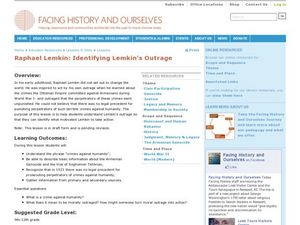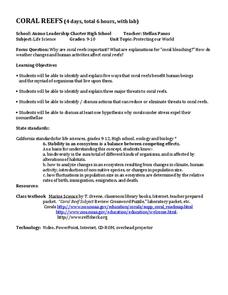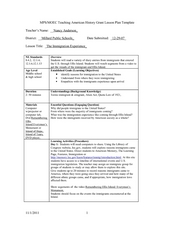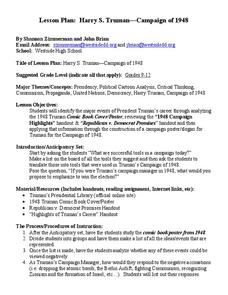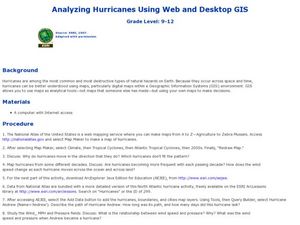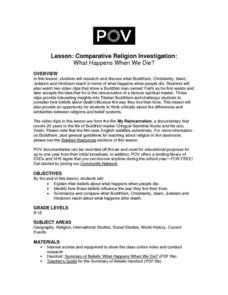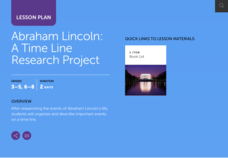Facing History and Ourselves
How Do Others Define Your Identity?
Sixth graders examine the relationship between the individual and society. In this World History instructional activity, learners read a book that discusses labels put on individuals. Students create a story board in relation to the book.
Facing History and Ourselves
What Aspects of Our Identities Do We Show to Others?
Sixth graders consider how they present their personal identities. In this character education lesson plan, 6th graders define themselves as they create masks that represent their personalities. Students share their masks and discuss...
Facing History and Ourselves
Who Are We?
Sixth graders explore the diversity of communities. In this community-building lesson, 6th graders compose biopoems and create a classroom exhibit entitled "Who am I? Who are We?"
Facing History and Ourselves
Raphael Lemkin: Identifying Lemkin's Outrage
Students examine World War I war crimes. In this world history lesson plan, students use primary and secondary sources to research Armenian genocide and the trial of Soghomon Tehlirin.
Curated OER
Coral Reefs
Young scholars research coral reefs and identify their benefits to humans, threats to the reef, how to reduce and eliminate threats, and more. In this coral reef lesson plan, students research the reefs, and take a field trip to an...
Curated OER
The Immigration Experience
Students research the reasons people immigrated to the United States. In this United States history lesson plan, students explore the causes and effects of immigrating. Students engage in a role-playing scenario , watch a video, and...
Curated OER
Harry S. Truman - Campaign of 1948
Students establish the major events leading up to the election in 1948. In this U.S. History lesson, students research details about Harry S. Truman, then they participate in a class discussion about him so that they are ready to...
Curated OER
Big Cats
Students study what a niche is and its role in a community. In this cats instructional activity students research the Internet for information on big cat species.
Curated OER
You Be the Coach
Young scholars brainstorm their favorite sports with one another. They work together in small groups based on their interests in sports. They research the coaching of that sport by reviewing different resources. They demonstrate their...
Curated OER
Introducing Literature Circle Roles to Students
Students read a narrative selection and select a literature circle role. In this reading comprehension instructional activity, students work in groups to identify vocabulary, make text connections, or other reading comprehension...
Curated OER
Holocaust Theme
Learners complete a unit of lessons on the events of the Holocaust during WWII. They write daily journal entries, create a collage, view and discuss videos, read and analyze novels and poetry, and complete a novel project.
Curated OER
Marvelous Mysteries
Fifth graders explore mystery stories. In this reading and writing lesson, 5th graders complete a planning guide for an original mystery. Students use the writing process to create a mystery story.
Curated OER
Simulating a Middle East Peace Summit
Tenth graders explore the issues in the Middle East. In this World History instructional activity, 10th graders research the problems between Palestine and Israel. Students write a speech on their point of view of the peace process.
Curated OER
Trout Are Made of Trees Crayon Mural
Students recognize that for a trout habitat to be ideal, several components must be present. In this trout lesson, students explore what makes a healthy stream. Students create paintings for a mural of a trout habitat. Students uncover...
Curated OER
Analyzing Hurricanes Using Web and Desktop GIS
Students analyze hurricanes. In hurricanes lesson, students use the Internet and GIS to analyze hurricanes. Students view the National Atlas of Maps to discuss the direction hurricanes move. Students study the wind and pressure fields to...
Curated OER
Make Your Own Compass
Students explore magnetism. In this "magnets" science lesson, students make a compass with common household items and explain the relationship between what a compass does and the earth's magnetic fields.
Middle Tennessee State University
Who's Afraid of the Big Bad Wolf? A Comparison in American Culture
As part of their study of the Progressive Era, class groups examine a 20th century version of "The Three Little Pigs" through a New Era lens and identify how ideals such as the value of hard work, creativity, and problem solving, etc.,...
Middle Tennessee State University
A House Divided: The Civil War Home Front in Tennessee
To broaden their understanding of both the short term and long terms effects of the Civil War, class groups examine primary source materials and then assume the role of a family member and draft a letter to a soldier describing life at...
Facing History and Ourselves
Taking a Stand: Models of Civic Participation
How does an individual take a stand for a principle or belief? what skills are required to do so? What are the challenges and risks in doing so? Class members study examples of individuals engaging in such activities and then identify...
Facing History and Ourselves
Justice After the Holocaust
Though there could be no true justice for the horrors of the Holocaust, many of those responsible for crimes against humanity were found guilty in the eyes of the law. Using primary and secondary sources in the 16th installment of a...
Library of Congress
Industrial Revolution
Could you live without your phone? What about cars, steel, or clothing? Class groups collaborate to produce presentations that argue that either the telephone, the gramophone, the automobile, the textile industry, or the steel industry...
American Documentary
Comparative Religion Investigation: What Happens When We Die?
How do different religions offer explanations for what happens when we die? Invite your learners to consider the variance and complexity of religious beliefs, and to research and compare/contrast the concept of death and afterlife...
Curated OER
The Monroe Doctrine: Whose Doctrine Was It?
Was James Monroe the sole contributor of the Monroe Doctrine? Young scholars study the doctrine and cite evidence to show contributions of John Quincy Adams and Thomas Jefferson in its formulation.
Scholastic
Abraham Lincoln: A Time Line Research Project
Though Abraham Lincoln's life was tragically cut short, it was filled with accomplishments and inspiring moments that continue to influence American democracy. Explore the ways the 16th president of the United States made his way from a...





